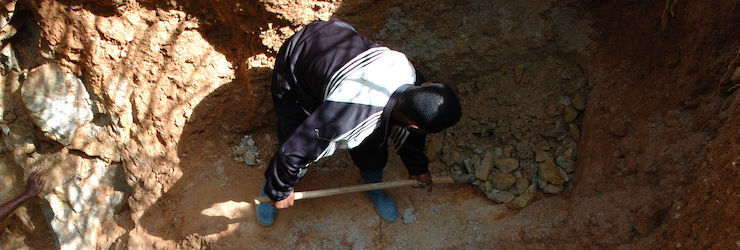"Companies are faced with a major problem: They simply cannot deliver as they want - there are too few LCA experts and the dynamics are too high." - Peter Schmidt, CEO of iPoint in Reutlingen, brings the current challenges of the industry clearly to the table: we talk to him about the challenges of CO2 reduction, the associated opportunities and how consistent digitisation with intelligent logic helps to achieve the ambitious goals more quickly.
This is part 1 of our interview.
Mr Schmidt: What do you see as the current challenges facing the industry, particularly with regard to life cycle assessments (LCAs) and product carbon footprints (PCF)?
I had two conversations recently that showed that the pressure to monitor and control lifecycle impacts is getting higher and more noticeable. More and more of the big names in the market are now following up the words "CO2 reduction" up to "Net-Zero" with deeds. Timing is crucial because many of the promises are time-related. Large corporations have set themselves a 5-10 year deadline to meet their promises.
This has far-reaching consequences - deep into the supply chain. In most cases low-hanging fruit, i.e. measures that can be achieved quickly and easily, have already been realised. In most cases, this applies to Scope 2 in relation to purchased energy and the associated minimisation of consumption. But now it's about much more: it's about the product lifecycle... What is the real carbon footprint of the products?
If we take a closer look, this means a consistent, transparent and conclusive presentation of the carbon footprint down to the individual material. Many companies do not have the expertise to support this.
The pressure exerted on the OEM has an impact on the entire supply chain. Everyone is now called upon to provide the necessary information of a PCF. Not just based on generic secondary data. Over time, there will have to be a gradual transition to real primary data.
You are talking about increasing demands and increased pressure: Where does this pressure come from?
The pressure is coming from political, economic and social expectations all coming together here. Politicians are under pressure to act to counteract climate change. They are currently enacting more and clearer regulations every year and will continue to do so.
Society is also very attentive to the issue of CO2 emissions. Purchasing decisions are increasingly made dependent on a good to neutral CO2 balance. The carbon footprint of a product is becoming the new calorie statement. It will be the deciding factor in purchasing. Those who cannot deliver this will lose their market share - and this brings us to the third in the group:
The investors, who play a very important role as shareholders, especially for large corporations are also applying pressure. Today, no one invests in companies that do not have a clear CO2 reduction target. The pressure is increasing all the time because the change is not happening fast enough for everyone involved.
What does this change mean for you as a software company?
We have a lot of expertise in this field. Especially in the automotive industry, we are a name that stands for professional and reliable solutions in digitalized compliance and sustainability management.
Openness along the supply chain and data transparency with guaranteed protection of intellectual property are important to us. One key factor has made us an important partner for the industry, we employ experts who address and tackle challenges with experts at eye level.
We at iPoint have hard-coded listening and understanding into our DNA for over 20 years. It enables us to support our customers and the industry with products that help them to master each challenge as it arises.
This latest challenge needs an approach that is both practical and visionary. Recognizing changes, anticipating developments and reacting to them with smart technology is an essential part of doing business. Our offering needs a combination of expert knowledge in the area of product sustainability and compliance and the know-how for smart information technology.
Our customers are looking to us to help them close the gaps. We are one of the few companies who can close do this.
To go into the experience in more detail: Digitalization and sustainability - how do you bring these two buzzwords together?
Digitalization is a word that has been overused: but it is the key to the most economical and correct answer to the challenges already mentioned. The value of complete data collected for compliance is increasing: Information in parts and material lists, in international databases, such as "International Material Data System" (IMDS) used in the automotive industry can be reused for sustainability and LCA calculations. This data is now being reused and repurposed, but in order to do so it must be linked logically and intelligently. LCA models are also more dynamic and flexible today.
All this plays into the hands of consistent digitalization. From an economic point of view, digitalization and automation offers the necessary benefits: speed, independence of location, scalability and, above all, calculability of performance and costs through cloud technology. This is exactly what we offer.
Mr. Schmidt, as a software manufacturer, how do you support the industry? Especially in the area of the product lifecycle?
Creating a carbon footprint of products (PCF) is one of the core tasks at the moment. The previous manual or even semi-automated approaches, combined with the fact that too few LCA experts are available on the market, present all companies with a major problem: they simply cannot deliver.
This is a task that is becoming increasingly urgent: for the reasons already mentioned, the frequency with which analyses and reports have to be prepared in order to track down CO2 sources has risen and will continue to rise. No longer are one or two product LCAs sufficient, but a whole multitude are required - and this is where our tools support the industry: It's about sensible, neutral and largely automated data handling.
LCAs enable companies to adapt their processes to reduce emissions in both current and future products. Scope 3, i.e. emissions generated in the value chain, cover 70-80% of a company's carbon footprint and are therefore an extremely important metric on the path to global sustainability.
Location-independent and powerful, LCAs can now be calculated - using generic models quickly or even individual product models. This is where the smart approach comes into play: creating PCFs automatically. The sheer mass of data that is demanded now and in the future can logically only be fulfilled by automated digital calculations, based on data, rules and mappings supplied by experts. the only logical consequence. This is what we offer.
Let's take the automotive industry as a current example. With iPoint Product Sustainability, we enable access to IMDS via our Compliance Manager. This means that essential information is already available for the creation of PCFs. This information can then be processed automatically in our software, which in turn saves companies time and manpower - an enormous economic support, especially in industries with large product catalogues.
We will continue in Part II of our interview with Peter Schmidt, which will be published shortly.



.png)


